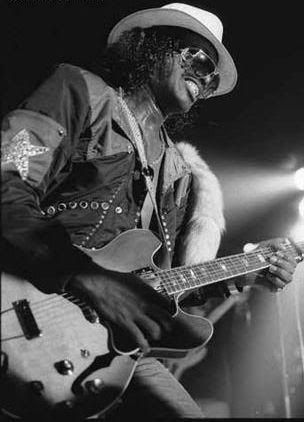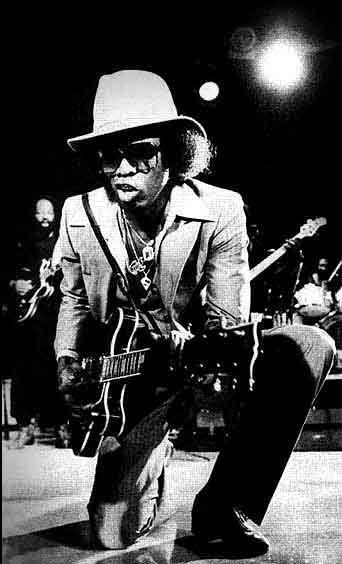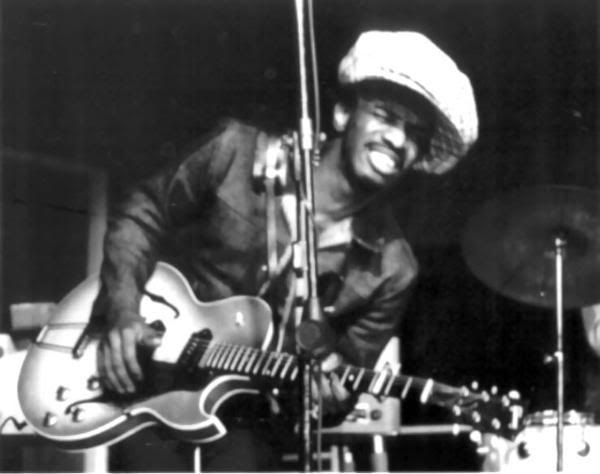Post by cofi on Apr 15, 2008 16:38:06 GMT
Johnny "Guitar" Watson

Johnny "Guitar" Watson (February 3, 1935 - May 17, 1996) was an American musician whose long career influenced the development of blues, soul music, rhythm & blues, funk, rock music, and rap music.
John Watson, Jr. was born in Houston, Texas. His father John Sr. was a pianist, and taught his son the instrument. But young Watson was immediately attracted to the sound of the guitar, in particular the electric guitar as practiced by the "axe men" of Texas: T-Bone Walker and Clarence "Gatemouth" Brown.
His grandfather, a preacher, was also musical. "My grandfather used to sing while he'd play guitar in church, man," Watson reflected many years later. When Johnny was 11, his grandfather offered to give him a guitar if, and only if, the boy didn't play any of the "devil's music"--blues. Watson agreed, but "that was the first thing I did." A musical prodigy, Watson played with Texas bluesmen Albert Collins and Johnny Copeland.
His parents separated in 1950, when he was 15. His mother moved to Los Angeles, and took Johnny with her.
In his new city, Watson won several local talent shows. This led to his employment, while still a teenager, with Jump blues style bands such as Chuck Higgins's Mellotones and Amos Milburn. He worked as a vocalist, pianist, and guitarist.
He quickly made a name for himself in the African-American juke joints of the West Coast, where he was billed as "Young John Watson" until 1954. That year, he saw the Sterling Hayden film "Johnny Guitar," and a new stage name was born.
He affected a swaggering, yet humorous personality, indulging a taste for flashy clothes and wild showmanship on stage. His "attacking" style of playing, without a plectrum, resulted in him often needing to change the strings on his guitar once or twice a show, because he "stressified on them" so much, as he put it.
His seminal blues album Gangster of Love was recorded in 1953 or '54, and first released on Keen Records (his labelmates included Sam Cooke) in 1957. It was not especially heralded at the time - the title song in particular was deemed too fast, too raw, and too witty, especially compared to the likes of the then-kingpins of blues Muddy Waters and Howlin' Wolf. Watson's ferocious "Space Guitar" of 1954 pioneered guitar feedback and reverb. Watson would later influence a subsequent generation guitarists.
He toured and recorded with his friend Larry Williams, as well as Little Richard, Don & Dewey, The Olympics, and Johnny Otis. He also played with Sam Cooke, Herb Alpert and George Duke. But as the popularity of blues declined and the era of soul music ascended in the 1960s, Watson in his inimitable style transformed himself from a southern blues singer with a pompadour into an urban soul singer with a pimp hat. He went all out - gold teeth, broad-brimmed hats, fly suits, designer sunglasses, and ostentatious jewellery made him one of the most colorful figures in the West Coast funk circle.
He modified his music accordingly. His LPs Ain't That a Bitch and Real Mother For Ya were landmark recordings of '70s funk. "Telephone Bill" (on Love Jones 1980) featured complex, rapid-fire lyrics that foreshadowed rap music. His subsequent LPs employed "the computer sound," and popularized it.
In his exhaustively researched book Dream Boogie: The Triumph of Sam Cooke (2005), Peter Guralnick claims that Watson was an actual pimp, as well as a performer! However, Watson reportedly felt "ambivalent" about prostituting women, even though it "paid better" than music.
The shooting death of his friend Larry Williams in 1980 and other personal setbacks led to Watson briefly withdrawing from the spotlight in the Eighties. "I got caught up with the wrong people doing the wrong things," he was quoted as saying by the New York Times. Nevertheless, a series of summer appearances in France resulted in his becoming known there as the "Godfather of Funk."
The release of his album Bow Wow in 1994 brought Watson more visibility and chart success than he had ever known. The album received a Grammy nomination, and retrospective releases of his work showered him with critical acclaim.
In a 1994 interview with David Ritz for liner notes to The Funk Anthology, Watson was asked if his 1980 song "Telephone Bill" anticipated rap music. "Anticipated?" Watson replied. "I damn well invented it!... And I wasn't the only one. Talking rhyming lyrics to a groove is something you'd hear in the clubs everywhere from Macon to Memphis. Man, talking has always been the name of the game. When I sing, I'm talking in melody. When I play, I'm talking with my guitar. I may be talking trash, baby, but I'm talking."
In 1995, he was given a Pioneer Award from the Rhythm & Blues Foundation in a presentation and performance ceremony at the Hollywood Palladium.
His international bookings soared. Back home, his music was sampled by Redman (He based his Sooperman Luva saga on Johnny "Guitar" Watson's Superman Lover song),Ice Cube, Eazy-E, Snoop Dogg, Dr. Dre, Jay-Z, and Mary J. Blige. He sometimes would enter the studio with rappers, at their request. Snoop Dogg and Dr. Dre borrowed P-Funk's adaptation of Watson's catchphrase "Bow Wow Wow yippi-yo yippi-yay" for Snoop's hit "What's My Name."
"Johnny was always aware of what was going on around him," recalled Susan Maier Watson (later to become the musician's wife) in an interview printed in the liner notes to the Collectables album The Very Best of Johnny 'Guitar' Watson. "He was proud that he could change with the times and not get stuck in the past."
Watson died on stage May 17, 1996, while on tour in Yokohama, Japan. His remains were brought home for internment at Forest Lawn Memorial Park Cemetery in Glendale, California.

ETTA JAMES - "I got everything from Johnny ... He was my main model ... My whole ballad style comes from my imitating Johnny's style ... He was the baddest and the best ... Johnny Guitar Watson was not just a guitarist: the man was a master musician. He could call out charts; he could write a beautiful melody or a nasty groove at the drop of a hat; he could lay on the harmonies and he could come up with a whole sound. They call Elvis, the King; but the sure-enough king was Johnny 'Guitar' Watson.""Reinvention" could just as easily have been Johnny "Guitar" Watson's middle name. The multi-talented performer parlayed his stunning guitar skills into a vaunted reputation as one of the hottest blues axemen on the West Coast during the 1950s. But that admirable trait wasn't paying the bills as the 1970s rolled in. So he totally changed his image to that of a pimp-styled funkster, enjoying more popularity than ever before for his down-and-dirty RB smashes "A Real Mother for Ya" and "Superman Lover." Watson's roots resided within the fertile blues scene of Houston. As a teen, he played with fellow Texas future greats Albert Collins and Johnny Copeland. But he left Houston for Los Angeles when he was only 15 years old. Back then, Watson's main instrument was piano; that's what he played with Chuck Higgins' band when the saxist cut "Motorhead Baby" for Combo in 1952 (Watson also handled vocal duties). He was listed as Young John Watson when he signed with Federal in 1953. His first sides for the King subsidiary found him still tinkling the ivories, but by 1954, when he dreamed up the absolutely astonishing instrumental "Space Guitar," the youth had switched over to guitar. "Space Guitar" ranks with the greatest achievements of its era -- Watson's blistering rapid-fire attack, done without the aid of a pick, presages futuristic effects that rock guitarists still hadn't mastered another 15 years down the line. Watson moved over to the Bihari Brothers' RPM label in 1955 and waxed some of the toughest upbeat blues of their time frame (usually under saxist Maxwell Davis's supervision). "Hot Little Mama," "Too Tired," and "Oh Baby" scorched the strings with their blazing attack; "Someone Cares for Me" was a churchy Ray Charles-styled slow-dragger, and "Three Hours Past Midnight" cut bone-deep with its outrageous guitar work and laid-back vocal (Watson's cool phrasing as a singer was scarcely less distinctive than his playing). He scored his first hit in 1955 for RPM with a note-perfect cover of New Orleanian Earl King's two-chord swamp ballad "Those Lonely Lonely Nights." Though he cut a demo version of the tune while at RPM, Watson's first released version of "Gangster of Love" emerged in 1957 on Keen. Singles for Class ("One Kiss"), Goth, Arvee (the rocking introduction "Johnny Guitar"), and Escort preceded a hookup with Johnny Otis at King during the early '60s. He recut "Gangster" for King, reaching a few more listeners this time, and dented the RB charts again in 1962 with his impassioned, violin-enriched blues ballad "Cuttin' In." Never content to remain in one stylistic bag for long, Watson landed at Chess just long enough to cut a jazz album in 1964 that placed him back behind the 88s. Along with longtime pal Larry Williams, Watson rocked England in 1965 (their dynamic repartee was captured for posterity by British Decca). Their partnership lasted stateside through several singles and an LP for OKeh; among their achievements as a duo was the first vocal hit on "Mercy, Mercy, Mercy" in 1967 (predating the Buckinghams by a few months). Little had been heard of this musical chameleon before he returned decked out in funk threads during the mid-'70s. He hit with "I Don't Want to Be a Lone Ranger" for Fantasy before putting together an incredible run at DJM Records paced by "A Real Mother for Ya" in 1977 and an updated "Gangster of Love" the next year. After a typically clever "Strike on Computers" nicked the RB lists in 1984, Watson again seemed to fall off the planet. But counting this remarkable performer out was always a mistake. Bow Wow, his 1994 album for Al Bell's Bellmark logo, returned him to prominence and earned a Grammy nomination for best contemporary blues album, even though its contents were pure old-school funk. Sadly, in the midst of a truly heartwarming comeback campaign, Watson passed away while touring Japan in 1996.

"Reinvention" could just as easily have been Johnny "Guitar" Watson's middle name. The multi-talented performer parlayed his stunning guitar skills into a vaunted reputation as one of the hottest blues axemen on the West Coast during the 1950s. But that admirable trait wasn't paying the bills as the 1970s rolled in. So he totally changed his image to that of a pimp-styled funkster, enjoying more popularity than ever before for his down-and-dirty RB smashes "A Real Mother for Ya" and "Superman Lover." Watson's roots resided within the fertile blues scene of Houston. As a teen, he played with fellow Texas future greats Albert Collins and Johnny Copeland. But he left Houston for Los Angeles when he was only 15 years old. Back then, Watson's main instrument was piano; that's what he played with Chuck Higgins' band when the saxist cut "Motorhead Baby" for Combo in 1952 (Watson also handled vocal duties). He was listed as Young John Watson when he signed with Federal in 1953. His first sides for the King subsidiary found him still tinkling the ivories, but by 1954, when he dreamed up the absolutely astonishing instrumental "Space Guitar," the youth had switched over to guitar. "Space Guitar" ranks with the greatest achievements of its era -- Watson's blistering rapid-fire attack, done without the aid of a pick, presages futuristic effects that rock guitarists still hadn't mastered another 15 years down the line. Watson moved over to the Bihari Brothers' RPM label in 1955 and waxed some of the toughest upbeat blues of their time frame (usually under saxist Maxwell Davis's supervision). "Hot Little Mama," "Too Tired," and "Oh Baby" scorched the strings with their blazing attack; "Someone Cares for Me" was a churchy Ray Charles-styled slow-dragger, and "Three Hours Past Midnight" cut bone-deep with its outrageous guitar work and laid-back vocal (Watson's cool phrasing as a singer was scarcely less distinctive than his playing). He scored his first hit in 1955 for RPM with a note-perfect cover of New Orleanian Earl King's two-chord swamp ballad "Those Lonely Lonely Nights." Though he cut a demo version of the tune while at RPM, Watson's first released version of "Gangster of Love" emerged in 1957 on Keen. Singles for Class ("One Kiss"), Goth, Arvee (the rocking introduction "Johnny Guitar"), and Escort preceded a hookup with Johnny Otis at King during the early '60s. He recut "Gangster" for King, reaching a few more listeners this time, and dented the RB charts again in 1962 with his impassioned, violin-enriched blues ballad "Cuttin' In." Never content to remain in one stylistic bag for long, Watson landed at Chess just long enough to cut a jazz album in 1964 that placed him back behind the 88s. Along with longtime pal Larry Williams, Watson rocked England in 1965 (their dynamic repartee was captured for posterity by British Decca). Their partnership lasted stateside through several singles and an LP for OKeh; among their achievements as a duo was the first vocal hit on "Mercy, Mercy, Mercy" in 1967 (predating the Buckinghams by a few months). Little had been heard of this musical chameleon before he returned decked out in funk threads during the mid-'70s. He hit with "I Don't Want to Be a Lone Ranger" for Fantasy before putting together an incredible run at DJM Records paced by "A Real Mother for Ya" in 1977 and an updated "Gangster of Love" the next year. After a typically clever "Strike on Computers" nicked the RB lists in 1984, Watson again seemed to fall off the planet. But counting this remarkable performer out was always a mistake. Bow Wow, his 1994 album for Al Bell's Bellmark logo, returned him to prominence and earned a Grammy nomination for best contemporary blues album, even though its contents were pure old-school funk. Sadly, in the midst of a truly heartwarming comeback campaign, Watson passed away while touring Japan in 1996.
Taken from his my-space page,
If you want to hear some of "Johnny "Guitar" Watsons music, go on over to his my-space page, as he has four songs on there, "Superman Lover" "A Real Mother For Ya" "Looking Back" and "Gangster Of Love" awesome, great songs,
MySpace URL:
www.myspace.com/johnnyguitarwatson

